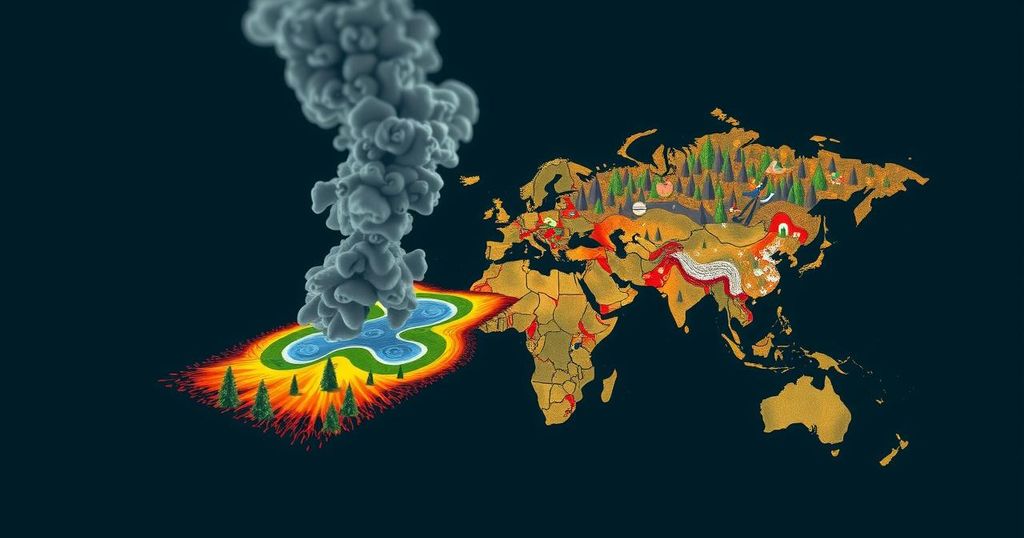Climate change
AFRICA, ARCH, ARCHIMEDES, BERKELEY, BIDEN, CLIMATE CHANGE, DONALD TRUMP, EGYPT, ENERGY, ENVIRONMENTAL POLICY, EPA, EUROPEAN, EUROPEAN UNION, GLOBAL WARMING, GREENHOUSE GAS EMISSIONS, MARY ANNAISE HEGLAR, MARY ANNAÏSE HEGLAR, NORTH AMERICA, PARIS AGREEMENT, TRUMP, U. S, UC, UC BERKELEY, UNITED STATES, US
Leila Ramsay
0 Comments
The Climate Crisis: Trump’s Policies as an Extinction-Level Event for the Planet
The article discusses the severe consequences of Donald Trump’s Project 2025 on climate change, predicting increased carbon emissions and potential environmental disasters. Scholars warn that Trump’s policies threaten progress made in reducing greenhouse gases, emphasizing the critical need for government action to combat climate change effectively. With only 26 years to achieve carbon neutrality, the upcoming elections will be pivotal for environmental policy, necessitating voter awareness of the implications of political choices on future climate stability.
The growing urgency surrounding climate change necessitates a thorough examination of political leadership and its implications on environmental policy. Scholars from UC Berkeley have raised alarm over Donald Trump’s Project 2025, which seeks to elevate fossil fuel production while dismantling critical regulatory frameworks. This plan poses a substantial risk to an already fragile ecosystem, as the U.S. is a significant contributor to global carbon emissions. By reversing current progress toward reducing greenhouse gases, Trump’s agenda could revive emissions levels not seen since 2007, exacerbating climate-related disasters and interrupts essential progress made during the Biden administration, such as the Inflation Reduction Act. Climate experts emphasize the critical window we face in addressing this crisis, with a mere 26 years remaining to achieve carbon neutrality. Failure to act could lead to catastrophic outcomes, including increased global temperatures that endanger human civilization. The recent severe weather events illustrate the consequences of inaction, with climate scientists linking the rise in deadly extreme weather to human-induced climate change. This reinforces the vital need for government intervention in mitigating climate risks. As such, the upcoming elections hold significant weight for the future of both the environment and human communities globally. Mary Annaïse Heglar poignantly stated, “If you know even a small amount about the fragile state of our ecosystem, you can recognize Donald Trump as an extinction-level event.” The contrast between the parties could not be clearer; one seeks to devastate the planet for short-term corporate gains, while the other aims for substantive climate action. As the world faces monumental challenges, it is paramount that voters prioritize environmental policies that assure a livable future for generations to come.
The urgency of climate change is a global crisis that has escalated in recent years, illuminating the need for robust political commitment to environmental stewardship. The United States, despite being a small fraction of the global population, significantly contributes to carbon emissions, playing a pivotal role in global climate dynamics. As the effects of climate change become increasingly evident, including extreme weather patterns and rising sea levels, the political landscape plays an essential role in shaping climate policies. Recent legislative actions, such as the Inflation Reduction Act, represent critical steps toward reducing greenhouse gas emissions, highlighting the contrasting priorities of the current administration versus those of past leaders, particularly Donald Trump, whose proposed policies threaten to roll back substantial environmental protections.
In conclusion, the battle against climate change is intrinsically linked to political leadership and policy. The urgency with which we address this pandemic defines our collective future. With pending elections, it is crucial for voters to consider the implications of leadership choices on both environmental policy and global stability. The divergence in priorities between parties could dictate whether humanity embraces a sustainable future or faces a perilous reality exacerbated by climate inaction. The stakes are undeniably high, necessitating informed and active voter engagement.
Original Source: www.juancole.com




Post Comment